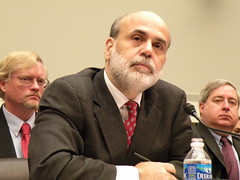Bernanke Endorsed by Senate Banking Committee, Supports Limited Fed Audit
by Sam Rosen-Amy, 12/18/2009
 Yesterday, in a bipartisan vote, the Senate Banking Committee approved Federal Reserve Chairman Ben Bernanke's nomination to a second term as Federal Reserve chairman. The vote wasn't in any doubt, although the closeness of the margin, 16 to 7, does indicate the contentiousness of Bernanke's nomination. The nomination now heads to the Senate floor, where, barring some crazy unforeseen calamity, he will be nominated to another four year term in January.
Yesterday, in a bipartisan vote, the Senate Banking Committee approved Federal Reserve Chairman Ben Bernanke's nomination to a second term as Federal Reserve chairman. The vote wasn't in any doubt, although the closeness of the margin, 16 to 7, does indicate the contentiousness of Bernanke's nomination. The nomination now heads to the Senate floor, where, barring some crazy unforeseen calamity, he will be nominated to another four year term in January.
However, the partisan breakdown of the committee's vote is a stark reminder of how much the politics of the economy has changed since Bernanke first became the Fed chair. Bernanke sailed through his first confirmation hearing in November 2005, as the then-Republican controlled Banking Committee approved him by voice vote. The hearings were so inconsequential that Senator John McCain, when asked about the nomination in January 2006, two months after the hearings, reportedly had no idea that the hearings had already happened.
Fast forward to today, when six of the seven no votes came from Republican senators. Senator Jim Bunning, to his credit, opposed Bernanke both times in committee. Ironically, Bunning's original reason for opposition in 2005 was that Bernanke was not "independent" enough, and would just be a rubber stamp for then-Chair Alan Greenspan's policies. Little did Bunning know that Bernanke's first term in office would be characterized by a dramatic undoing of Greenspan's legacy.
Bernanke Supports Limited Audit
In another piece of news from Bernanke's committee confirmation, in a letter responding to written questions from two committee members, Bernanke hesitantly endorsed limited audits of the Federal Reserve. Saying that audits "could provide Congress and the public additional comfort" that the Fed is acting in a responsible manner, Bernanke pledged to work with members of Congress to implement "a review of the operational integrity of these facilities," one that would "be structured so as not to involve a review of the monetary policy aspects of the facility." With his letter, Bernanke seems to be trying to strike a compromise with Audit the Fed supporters, allowing audits of some programs while protecting the Fed's monetary policy from oversight.
The key is which "facilities" Bernanke is referencing. The programs he specifically states are the central bank's emergency lending programs. These are the broader credit programs, not the single, institution specific loans, such as the loans to AIG, Citigroup, and Bear Stearns (remember them?), since these single institution loans are already subject to oversight by the Government Accountability Office. However, it isn't clear if the loans to foreign banks, which were also done under the emergency powers of the Fed, are included in Bernanke's idea of a limited audit. This detail is important, since the foreign bank program is the main target of the Fed audit. If that program is not on the table, then Bernanke's statement is relatively meaningless, politically.
The House passed its Audit the Fed provision as part of the larger financial reform package, so we'll see what happens in the Senate as it begins the final rounds of its financial reform debate. As of right now, the Senate's reform package does not include an audit provision, but with Bernanke's cautious approval of a limited audit, that might change.
Image by Flickr user talkradionews used under a Creative Commons license.



